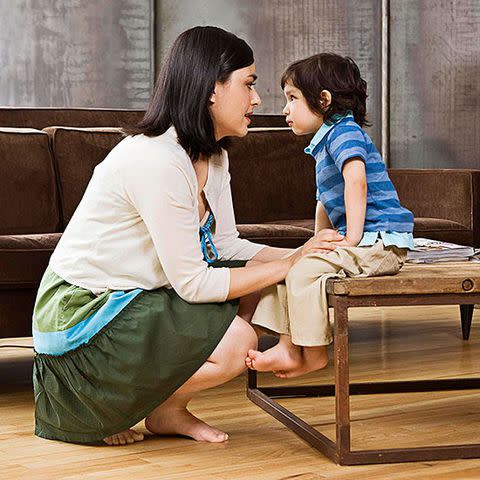How to Discipline Toddlers
The toddler years are a good time to start teaching boundaries and encouraging good behavior from your child. We'll show you how.

When your 1-year-old screams for candy or throws food out of your cart at the grocery store, it's hard to know how to deal with their behavior. After all, a child this age is still too young to be disciplined, right? Not quite.
While tactics like time-outs or taking away privileges don't work well on toddlers (they aren't old enough to link cause and effect), this is actually a good time to introduce your child to the concept of right and wrong. "Parents often think of discipline only in terms of punishment, but the origin of the word is 'to teach,'" says psychologist Deborah Roth Ledley, Ph.D., author of Becoming a Calm Mom: How to Manage Stress and Enjoy the First Year of Motherhood.
Read on to learn how to discipline your toddler with these simple strategies.
How to Discipline 1- and 2-Year-Olds

"With 1-year-olds, discipline really should be more about socializing children and teaching them boundaries," says Dr. Roth Ledley. The following strategies are good for 1- and 2-year olds:
Distraction
Consistency
Staying positive
Modeling
Praise
Humor
Reverse psychology
Keep it silly
Make it fun
Try Distraction

Fight the urge to yell at your child when they act up, because your tone can either make them upset or curious. "Instead, quickly and calmly get them interested in another activity," says psychologist Deborah Roth Ledley, Ph.D., author of Becoming a Calm Mom: How to Manage Stress and Enjoy the First Year of Motherhood. For example, if your toddler is climbing up on the sofa arm, gently move them onto the floor and start reading a book or playing with a toy together. Redirecting their attention not only puts a quick end to unwanted behavior, but it also teaches them over time that some things, like climbing on certain furniture, are off-limits.
Toddler Discipline Tips
Be Consistent

You might think that letting your crying child have a cookie before dinner "just this once" is pretty harmless. But giving in to your kid's demands encourages them to pitch another fit the next time they're not getting her way. "It's important to set limits and follow through on them again and again," says Gregory Oliver, a child psychologist at the Henry Ford Health System, in Detroit. You and your spouse also need to be on the same page when it comes to family rules. Sending your child mixed messages about whether they're allowed to splash in the bathtub or have to sit in a high chair when they eats could lead to confusion and frustration.
Keep It Positive

If you say the word "No!" to your child all the time, they may start to tune you out -- or worse, begin using it when they don't want to do something. "Save 'No!' for situations when safety is involved," says psychologist Deborah Roth Ledley, Ph.D., author of Becoming a Calm Mom: How to Manage Stress and Enjoy the First Year of Motherhood. If they are reaching for the oven door, for instance, you should quickly say "No!" in a stern voice. But when your child's behavior isn't dangerous, phrase your command in positive words: Instead of saying "No! Don't take your shoes off in the car!" try: "Leave them on until we get home, and then you can run around without them."
Show How It's Done

Toddlers get more out of watching what you do than listening to what you say, explains Penny Donnenfeld, Ph.D., a New York City psychologist. If your child is too rough with another kid at a play-date, demonstrate the behavior you want by modeling it: say, "Let's hug Emma softly," then take your child's arms and guide them into a gentle hug. Or, if you have a hard time getting your child to brush their teeth before bed, make doing it together part of your nightly routine.
Praise Good Behavior

Sometimes, toddlers act out because they lack communication skills—and it's a surefire way to get your attention. That's why you should always let your child know you're pleased whenever they do something that you like or remembers to follow one of your rules (such as putting their coat on the door hook when he comes inside). By doing this, you'll teach them that good behavior will also get them the attention they crave from you—and they might just keep it up.
Disciplining Kids of Different Ages
Employ Humor

Doing something that contradicts what toddlers and preschoolers know to be true cracks them up because they're just figuring out how the world works. When you turn the familiar on its head, toddlers revel in the fact that they're in on the joke.
For example, Amy Hunter, of Mobile, Alabama, mother to Henry and Lukas, both 2, says there's one thing that amuses the twins without fail: objects other than a hat placed on the head. "They were screaming because they didn't want to be in their car seats. I decided to ignore them and calmly handed them each a book to read, put in a Mozart CD, and drove off. Soon there was silence, followed by giggles. I congratulated myself on my fine parenting, but when I peeked back, Luke had put the book on his head. Now, when we have meltdowns at dinner, the whole family will eat with napkins on our heads." Hunter adds that she will crawl very slowly up the stairs, as if she's a baby, to get the boys to follow her to the bath.
Similarly, Carol O'Reilly says she can only get her daughter Noula, 3, to rinse her hair in the bathtub by pretending the cup of water is coffee. "Noula will take the cup and say 'Here's your coffee, Mom,' and I spill it over her head and she laughs hysterically," O'Reilly says.
Use Reverse Psychology

Telling your child to do the opposite of what you want them to do works because toddlers are contrary by nature and love to assert their independence.
When your 3-year-old refuses to eat dinner, you may feel like you're at the losing end of the struggle. But if you stop insisting they eat, see what happens:
"Chloe, eat your supper."
"I don't like it!"
"You love macaroni and cheese."
"No, I don't!"
"Okay, good. I'm going to go check on your brother, and I'll be right back, so don't touch that food because I'm going to gobble it all up."
Back in the kitchen a few minutes later, Chloe can barely contain herself. "Daddy, all gone!" she says, showing you the empty bowl.
"What?!" you exclaim in mock horror. "I was going to eat that!"
She laughs, Daddy laughs, and dinner is over.
Of course, this strategy has a limited lifespan. Your 5-going-on-16-year-old daughter may just roll her eyes if you try this. "Go ahead, Dad. It's all yours."
Say the Wrong Name

This one is similar to the shock-them-with-silliness strategy above. When you're locked in an argument, insert a different name-one they know is wrong-into the conversation.
When Scott Alexander's oldest child refused to stop playing to go pick up her brother from preschool, he said, "Come on, we have to go get Elmo!" The craziness of that statement ("Daddy, Elmo's not at Tommy's school!") distracted her from what she had been doing, allowing Alexander to get her out the door without a fight. (Of course, if your child is old enough to appreciate Elmo but not old enough to realize he can't possibly be waiting at the school, you're asking for trouble, but you'll at least get your child in the car.)
Try using this trick when your kids are insisting that only Daddy can pour their milk or read a story. (Response: "But I am Daddy!") This usually provokes screams of laughter, which moves things along somewhat.
More Fun Ideas

Sing silly songs. Simply changing one word can delight kids to no end. Think "Twinkle, Twinkle, Little Car."
Make bath and bedtime fun. You can hang your arm over the edge of the tub and pretend to be distracted; when your kid inevitably gets water on your hand, act surprised.
Play freeze tag. When the child says, "freeze," you must do so. It helps to be an inch away from tickling them and to mumble through frozen lips that they must unfreeze you!
false

